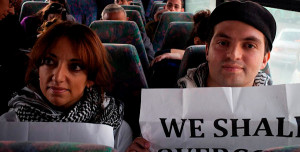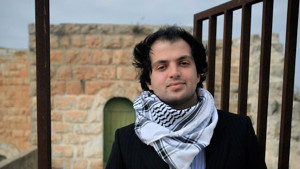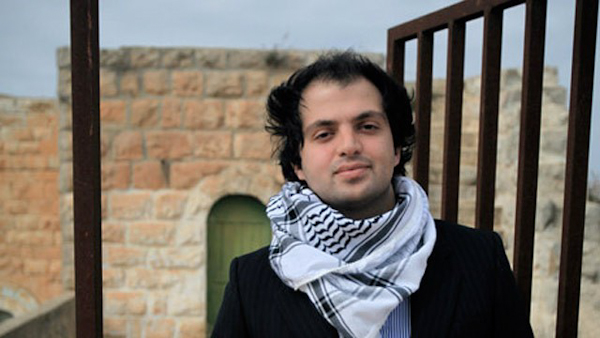Palestinian activist Fadi Quran ’10 seeks a nonviolent path to the future of the Middle East
At its core, quantum physics is a science of probabilities. When dealing with particle uncertainties and ambiguous dualities, a calculated likelihood is the closest thing to certainty. Fadi Quran ‘10 believes there is a lesson in this concept that can be applied to his work in social activism.
“The paths that particles take have multiple histories, each of which you must add together in order to predict the probabilities of where the particles may land,” Quran said. “In much the same way, as a social activist, every time I try and plan a strategy in advance, I take all the possible scenarios on that path and add them up to approximate what needs to be done to achieve the most successful result.”

Quran, 24, has bachelor’s degrees in both physics and international relations from Stanford. He is a leading figure in the burgeoning Palestinian youth movement committed to achieving “freedom, justice and dignity” for the Palestinian people. The movement, according to Quran, is not associated with any political factions, and categorically rejects the use of violence to achieve its goals.
Growing up in Ramallah in the West Bank, Quran witnessed firsthand the destructiveness brought on by violent protest during the Second Palestinian Intifada, which began in 2000.
“Your whole worldview changes,” Quran said, as he recalled bullets flying through his sister’s bedroom.
The devastation of the uprising impressed upon him a feeling of responsibility for changing the status quo in the Occupied Territories.
In recent months, Quran and his movement have risen greatly in prominence, receiving coverage from news organizations such as The Washington Post, Time Magazine and Al Jazeera. The “Freedom Rides” the group undertook last November received especially strong media attention. Inspired by the freedom riders of the 1960s civil rights movement who defiantly rode on segregated buses through the Jim Crow South, Quran and fellow activists boarded an Israeli commuter bus in the West Bank, hoping to end what they see as a discriminatory system.
Shortly after the bus departed for Jerusalem however, it was stopped and boarded by Israeli police. All six of the activists were arrested for trying to enter Jerusalem without the proper permits.
Last February at a protest in Hebron, Quran was again detained by Israeli authorities. This time, it was on charges of obstructing a law enforcement officer, assault and resisting arrest. During the incident, Quran was pepper-sprayed by police. Though he was released five days later on bail for lack of definitive evidence, Quran remains under investigation and is due for questioning again on May 3, as The Daily reported.
Being in prison had a profound effect on Quran. He spent his first two days in solitary confinement.
“When they [Israeli security forces] brought me in, I couldn’t see anything because of the pepper spray — the only thing open was my mind’s eye,” Quran recounted.
The pain and isolation forced Quran to evaluate his priorities.
“During that time, I thought about the world I wanted to see, the legacy I wanted to leave behind,” he said. “I was in pain and I was afraid for the first hour or two, but it was one of the most eye-opening experiences of my life.”
Quran’s resilience comes from a number of sources. As a teenager, he was moved by books about Nelson Mandela and Martin Luther King, Jr., two activists who also spent time in prison. The Palestinian community, too, inspired young Quran.
As a 10-year-old boy, he witnessed the selflessness of those who risked their lives to bring food to the needy and to assist the elderly who couldn’t leave their homes.
“Usually when we think of mentorship, we think of individuals — here in Palestine, the whole community acts organically to grow and mentor young men and women,” he said.

But Quran’s greatest source of inspiration continues to be his mother and grandmothers.
“One of the things that I’ve learned through my life experience is that powerful women who work hard, who nurture and care for their family, friends and community, are the key to a successful society and to great individuals,” he said. “They are the greatest individuals.”
Quran would also develop a close connection with the faculty and students at Stanford after his arrival in 2006. While he was applying to colleges, Quran hoped to pursue his interests in physics while studying a subject that could help him change the situation in Palestine. After consulting with friends and teachers, he discovered that Stanford was a place where he could do both.
Life in California, however, was vastly different from the one Quran had in Palestine.
“I remember days during the month-long curfews when I had to help my family and neighbors get bread,” Quran said. The dichotomy of those experiences and his life at Stanford, a “land of milk and honey,” was an important motivational tool.
“Seeing how challenging life actually is for some people gives you something to prepare for, to work toward,” he said.
Through classes and on-campus activism, Quran quickly developed his argumentative skills and cemented his place in the Stanford community.
“One of the great things about Stanford is that you can debate issues without the sense of fear that might be created at other places,” Quran said.
As a freshman, Quran became an active participant in the debate over whether Stanford should divest from companies allegedly associated with the Israeli military occupation of the West Bank. Taking a strong stance on this controversial issue ensured his position at the center of numerous campus debates. But, according to faculty members and peers, he always conducted himself with restraint, open-mindedness and tolerance.
“Fadi [Quran] has an incredible capacity to empathize with the perspectives of others,” said Allen Weiner, senior lecturer in law, who taught a conflict resolution seminar in which Quran was a student. Weiner remembers moderating a debate in one of his classes when Quran came under substantial pressure from students on the pro-Israel side of the argument.
“What was really impressive about Fadi was how committed he was to finding areas of common ground and mutual understanding, while still being very staunch in his defense of the interests of his community,” Weiner said.
Joe Gettinger ’11, who befriended Quran at Stanford, admired Quran’s insistence on understanding the other perspective on the divestment issue, but said he believes the most telling aspect of Quran’s character was his personal efforts to bridge the gap between communities.
“I remember he would come to Shabbat dinner to get to know people and to learn about their perspective,” Gettinger said. “That really said a lot because there was very little to gain politically from such a move, it was really about getting to know the community. That’s what makes Fadi so special.”
Being at Stanford also taught Quran important lessons in innovation and entrepreneurship that he would later apply to his start-up in alternative energy, Tayara Energy. Running the business, which is located in the West Bank, requires Quran to tap into his interdisciplinary education, making use of his skills as both a community organizer and a scientist. Quran sees the start-up as one step toward fulfilling the goal of Palestinian self-sufficiency.
Currently, Tayara Energy’s major projects include designing a high altitude wind generator to provide electricity to rural communities, setting up programs to train young people in proper recycling procedures to benefit refugee camps and integrating affordable solar panels into more construction projects in the Middle East.
When Quran is not participating in protests or running his company, he studies constitutional law and revolutions at Birzeit University in Ramallah, where he is pursuing his master’s degree. Balancing activism, entrepreneurship and academics can often present a heavy load.
The way Quran sees it, though, “it is not so much a question of balancing as it is a question of integration.”
“A lot of the time at Stanford you’re taught to make compartments…something I’ve learned is that actually in most cases, I can integrate everything together through an interdisciplinary approach,” Quran said.
But that doesn’t mean life isn’t full of stress for Quran. The day before his interview with The Daily, a friend of Quran’s was arrested in Bahrain. Quran spent an anxious night worrying about the fate of his friend and writing a paper due the next day.
His community, he says, has become accustomed to arrests.
“There is always a sense of fear and anxiousness when a family member or friend is arrested,” he said. “Sometimes there is a fleeting sense of despair, but it is not as raw as the first time was.”
Regarding the future, Quran is cautiously optimistic, not only for the Palestinians, but for the whole region. All around him, he said, he sees a new generation of Middle Eastern youth focused on social and business entrepreneurship. He also sees young Arab academics in unprecedented numbers pursuing “science and truth.”
All this, he believes, points toward a tipping point in the near future in which acts of nonviolence generate more acts of nonviolence until the Palestinian youth movement and others like it become full-fledged nonviolent uprisings.
“Then, we will achieve peace,” he said.
